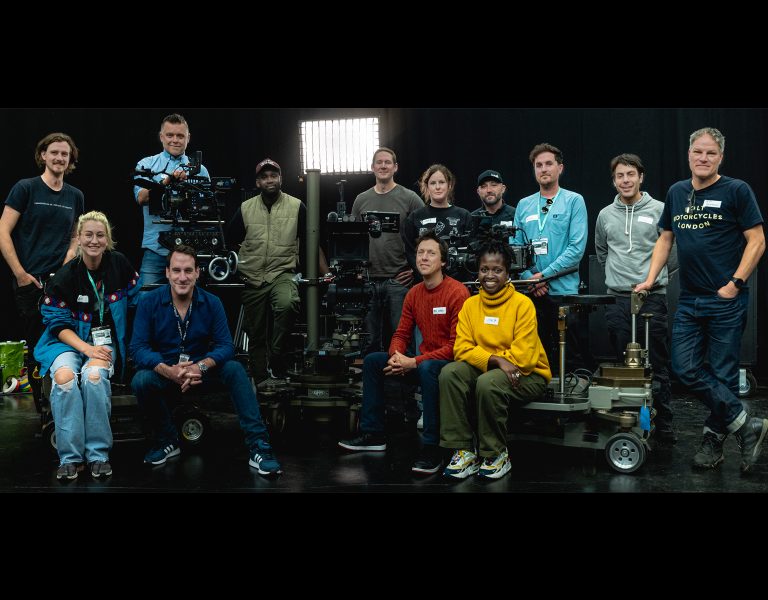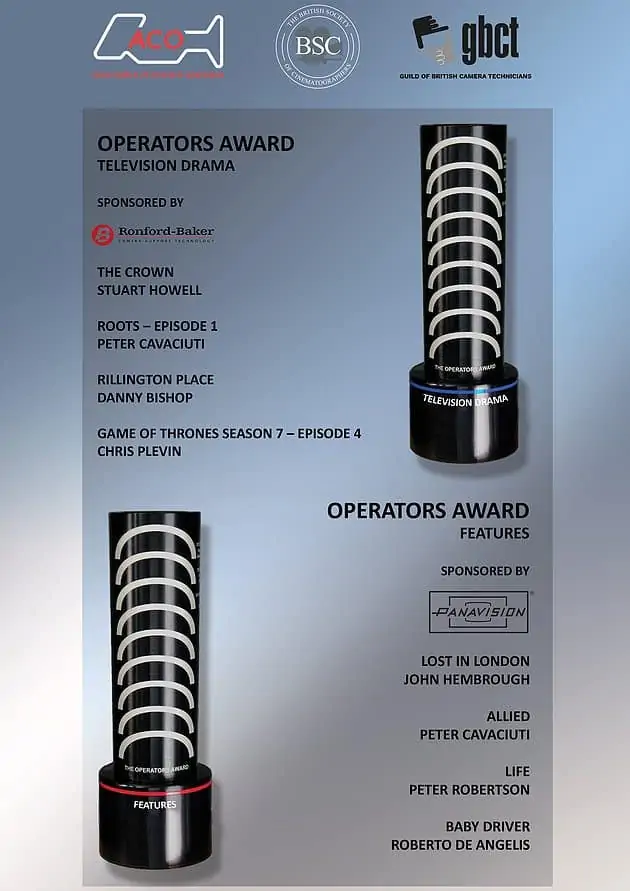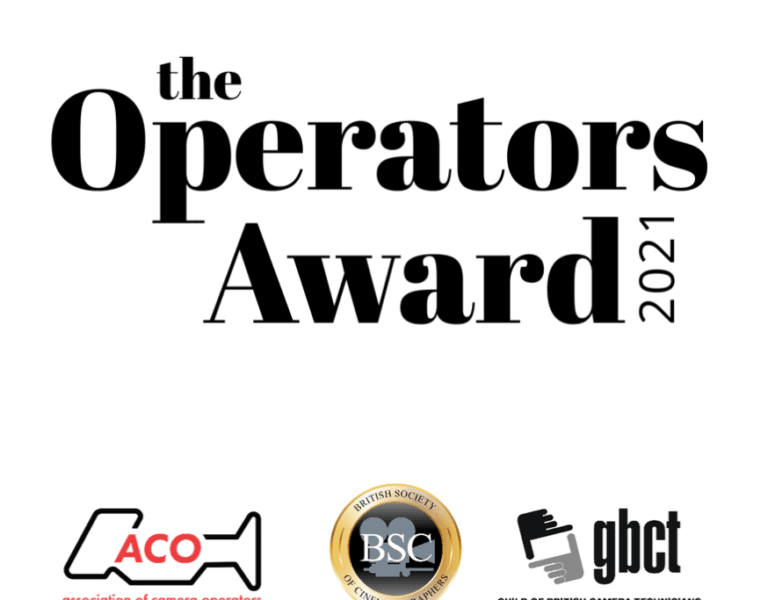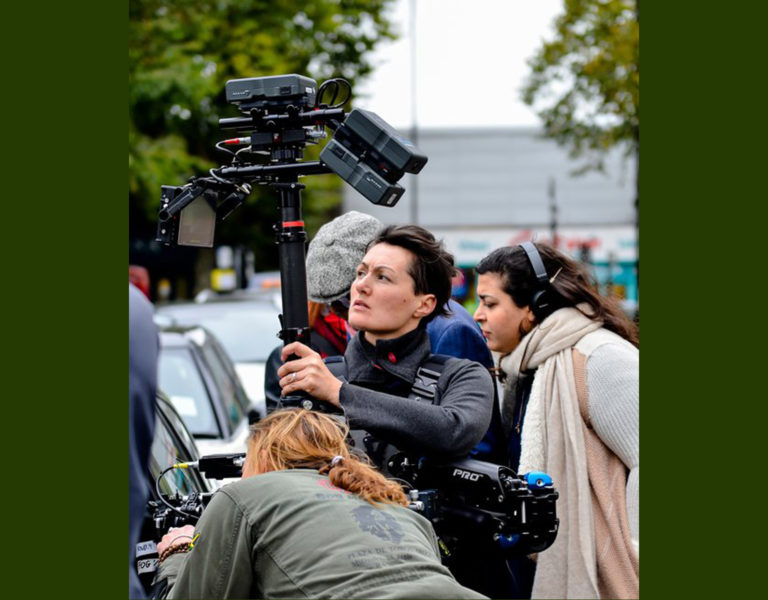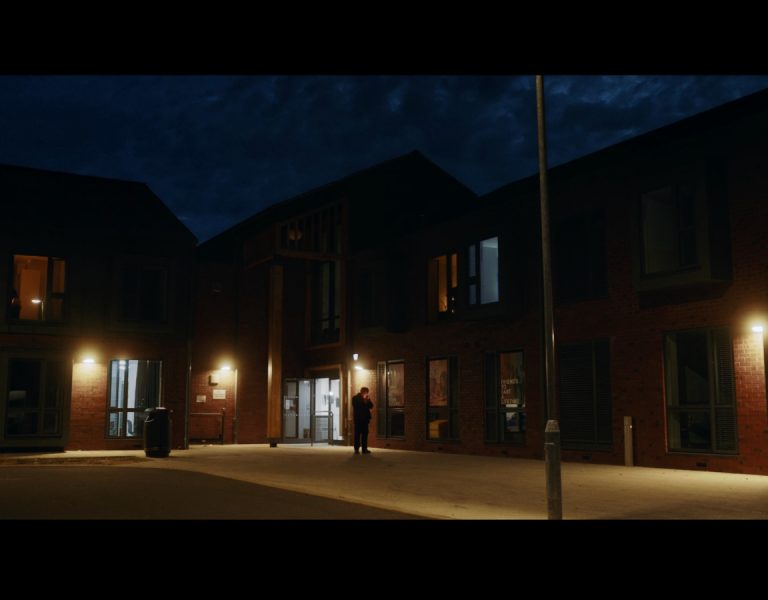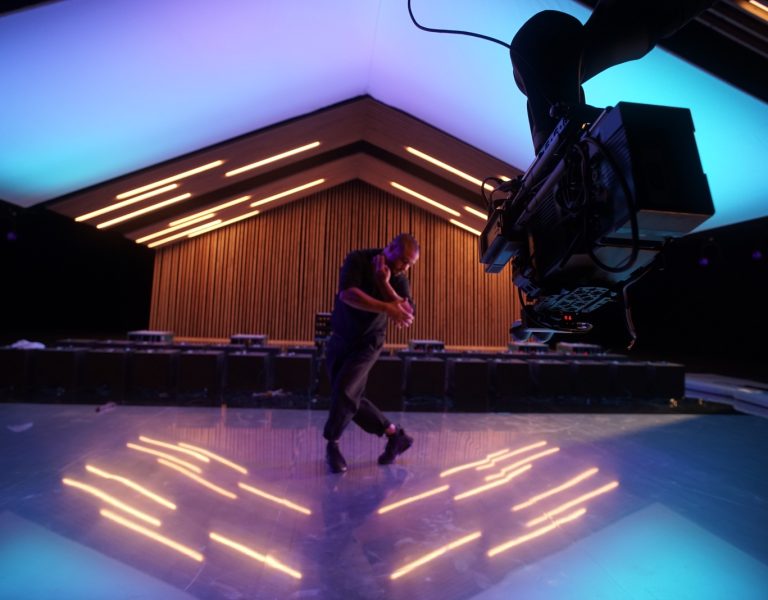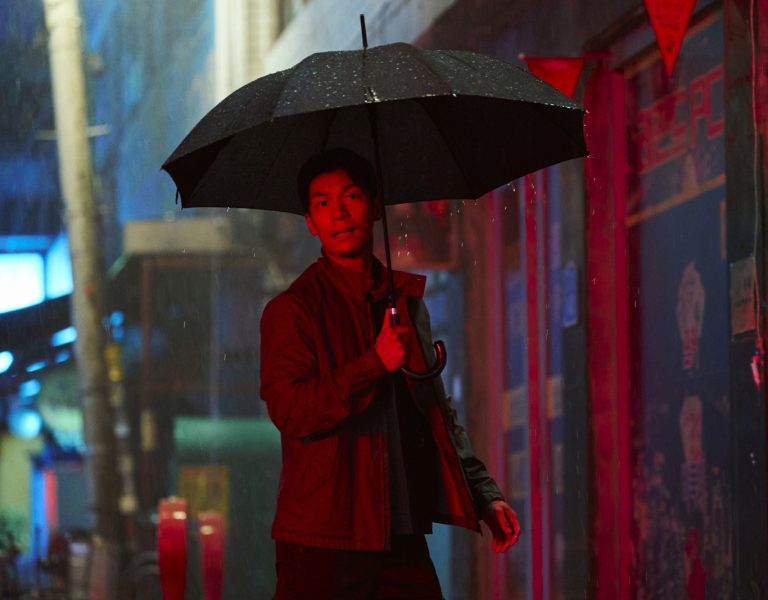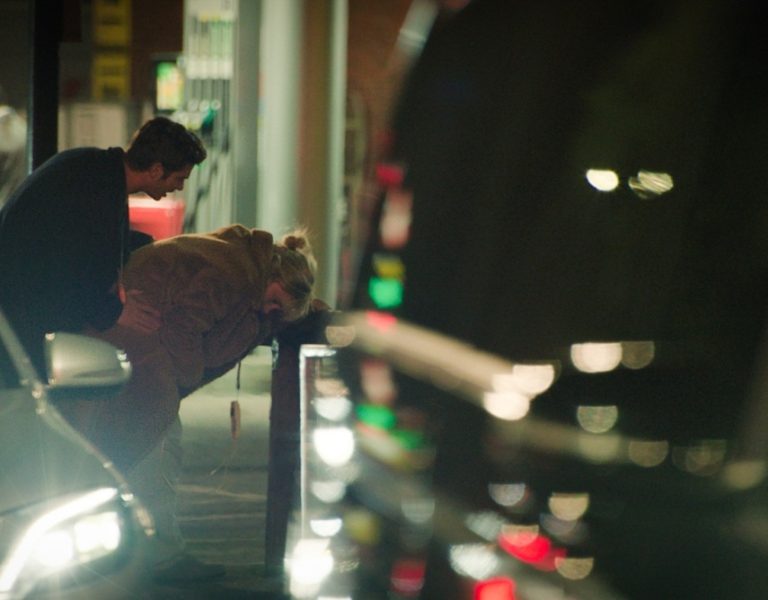PASSION FOR EDUCATION
The ACO’s Zoe Goodwin-Stuart shares details of the association’s training offerings including the success of a recent course aiming to elevate attendees to the next level in their career.
“Tell me and I forget, teach me and I may remember, involve me and I learn.” – Benjamin Franklin
At the ACO we are passionate about providing training courses for our membership. With an incredible depth and wealth of knowledge from our Full members we run regular training courses throughout the year with specialisations in Handheld, Steadicam, Geared and Remote Heads. The ACO has been committed to upskilling the membership for many years and in this current climate the motivation to engage with our members was paramount. The ACO training committee work tirelessly with the Board at the ACO and Patrons to provide innovative ways of teaching the skills and craft it takes to be a confident, capable, and creative operator in any situation. This is done with no outside funding and purely from the drive and passion of our Board and our membership.
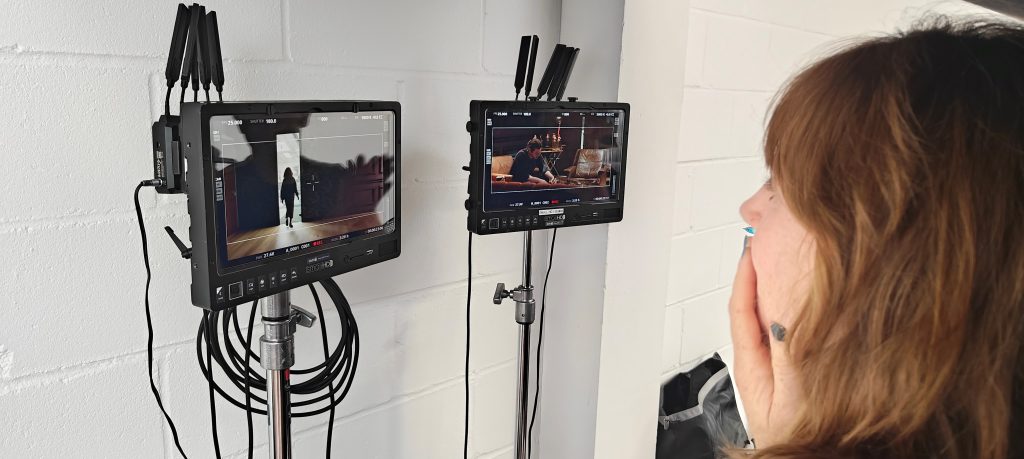
The idea for a one-day course came from a roundtable with some of our female membership. ACO President Peter Robertson ACO OSC Assoc. BSC and full member Danny Bishop ACO OSC Assoc. BSC held the meeting with some of our female camera operators to discuss some of the challenges and difficulties that can happen on set and how hard it can be, navigating crews and personalities and asserting oneself in high-pressure situations. After this in-depth conversation some of the main points that came from our members were the importance of communication, conviction, and confidence. All these skills are integral to working on a high-pressured film or TV environment. Working with any new team, asserting yourself and building good relationships with your fellow crew are imperative to making yourself heard and respected as an operator. But these skills are not easily learnt and can prove extremely difficult to implement especially if you are stepping up.
I drove home from that meeting with one thing on my mind – an ACO training course that could try to teach and hone these skills with our membership. The idea was to give operators a real-world environment in which they could learn how to perform to their best on set as an A or B camera operator. From watching a crew rehearsal to planning the shots with the director and DP to working with grips and focus pullers to achieve the shot and to completing a scene in a time frame just like on set conditions. I decided to organise a course structure that would involve as close to a full crew as possible. The timing, during the strikes, though unrelated, gave me even more drive and ambition to make this course as impactful as possible. To draw on the wealth of knowledge from all departments who, like most of us, currently find themselves without work. I felt the time was now to access the incredible pool of crew that could all pass on their individual knowledge from their own perspective, working together in this uncertain time to provide a training day from which we could all benefit.
So, for the first time, in September a Soft Skills and Communication course was born. I threw myself wholeheartedly into the planning and execution of this course as it is a skillset I am personally incredibly passionate about. With research and discussions with the Board of the ACO and advice from Danny Bishop who had recently run his own three-day masterclass in operating. I set about building a framework for our attendees. Our patrons, Shift 4, couldn’t have been more supportive of the idea and were more than happy to accommodate us and provide us with all the lighting, camera and grip kit we required. Not only that but, we were given full use of their incredible new space.
During this time, our Secretary of the ACO Sham Whittaker and I invited our Associate female membership to apply for four places on the course. Each attendee was sent a script, call sheet and tone book to help them feel more like this was a real shoot. Based on experience I placed them as either A or B camera operators for the day. We split the day into a morning and afternoon session with two operators in each group. Joined by Ilana Garrard ACO Assoc. BSC, who took on the role of director with script supervisor Angelica (Jelly) Pressello at her side. We began the day with a crew rehearsal from our actors run by our 1st AD Brittany Smith. First up were Kerry Arthur and Chai Rolfe.
“After rehearsal, our first call was to start mapping out camera positions on the back of our sides. Naturally, Kerry took the lead as A camera operator, opening with a developing wide shot on the dolly that takes in most of the room, leaving me to do the classic B Cam thing of trying to find a good shot whilst staying out of the way,” commented Rolfe.
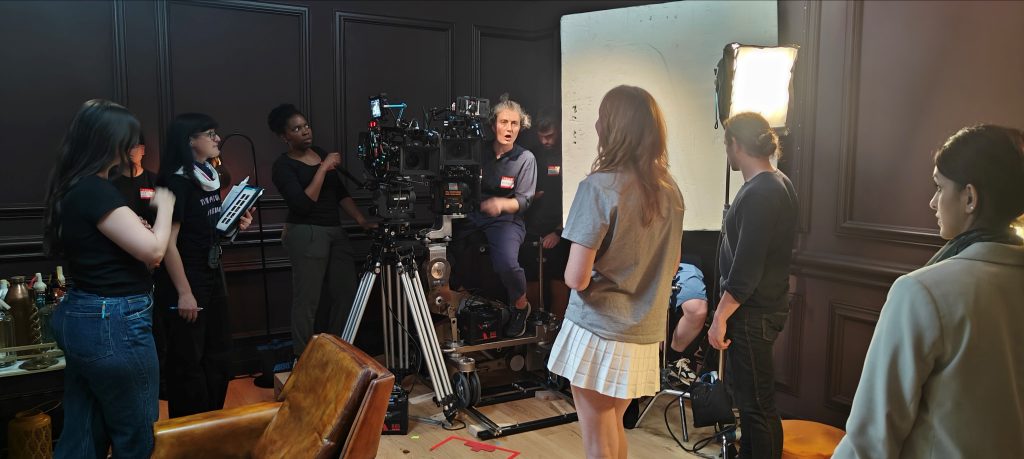
“Immediately, the crew snapped into action to get everything as it should be. Plans started changing, conflicting ideas started coming in from Ilana, DP Owen Cant and Jelly Pressello. This was all by design Zoe and Ilana wanted to create a sort of stress-testing environment to see how we each dealt with difficult situations (or as they call them, ‘stitch-ups’). With the noise levels and constant movement of kit, people, props, it certainly felt real.”
Arthur added: “What was unique about this day was that a full cast and crew had been put together to make it as real of an on-set experience as possible. This in turn meant you were also learning from all departments, reinforcing what is important to all of them and how to keep a happy set while doing the best you can – something that is very important to me.
“I found the day to be an invaluable experience in fine-tuning my on-set presence for running the floor as an A camera operator. With the curveballs that our two directors Ilana and Jelly would throw at us, it helped us think on our feet in terms of how to adapt with changing shots and the importance of clear communication.”
Our DP for this course was Owen Cant, a recent graduate from NFTS. This collaboration also brought a great dynamic to the day. With two camera teams, grip team, three cast members, make-up, costume and stand by props to navigate, as well as the curve balls thrown at them throughout the morning. They dealt with all the challenges extremely well. We took time to mentor and give advice when required but wanted to develop the skills required so the challenges were difficult, but they came through them very well. After a busy morning we broke for lunch, having completed three separate camera set-ups.
The afternoon began with our next two operators – Dora Krolikowska on A camera and Teresa Adamson on B camera – who had been observing the morning and the development of the scene. The day progressed with more challenges and with needing to turn around on the scene and various changes to the “vision” of our in-character directors we proceeded to complete another four set-ups. Various curve balls from make-up, costume and continuity were thrown at the operators during this session. Aided by the grips, 1st and 2nd Acs, all the attendees were provided with support and knowledge as well as solutions from craft professionals.
“Kerry and Chai were a joy to watch. Their confidence developing shots gave me the push I needed. I felt energised and ready for the challenges ahead when the second team, Dora and I stepped on to the floor. The shots we created were important and so are the processes in between. The communication, knowing when to communicate and how to do so. Each set up brought new challenges and relationship building. This should be a constant stream that runs through every team.”
Brittany Smith our 1st AD called a wrap on the days shooting with scene complete and we all settled down for a Q&A session with myself and Ilana Garrard. The floor was open to any questions from our attendees. We also opened it up to all the crew and cast to share their thoughts, observations, and advice. The conversations that developed were extremely interesting. We discussed what our operators learnt from the day and shared their thoughts about the course and their experiences in their careers thus far. The safe space we created to learn and develop on this course led to an open and honest conversation on all sides. The outcome of which was not just a combined agreement that working on set in the role of operator is collaborative at its heart. But that even though it takes the physical skills of operating but the communicative, interpersonal skills or “soft skills” when running a floor, setting up a shot, discussing with a director, working in harmony with your DP and generally formulating good working relationships with all departments including your cast members.
Speaking about their experiences on the course, attendee Kerry Arthur, said, “The thing I mostly got out the day was a boost to my confidence. By the end of the day, I realised I knew more than I thought I did. Having the opportunity to a run a floor surrounded by such friendly and supportive people and getting to meet new crew was a great way to spend a day. Having done a few ACO training days now I would emphasise how much they have helped me as a new operator, adding to my skills and allowing me to meet fellow operators to discuss our experiences. The support and kindness of everyone has bolstered me in what can sometimes be a difficult environment.”
Fellow attendee Chai Rolfe also found “the day was a hugely enjoyable and memorable way to show or remind us what else lies in an operator’s figurative tool-bag; not the tech side this time, but how to develop great relationships with crew and actors, communicate confidently, develop resilience and find order in what can be an extremely challenging environment.”
Sharing their positive comment on attending the training, Teresa Adamson, said, “Never forget the importance of your team. As an operator, sharpening your soft skills is vital to your success.”

The overwhelming positive feedback from the day resonated through everyone involved. This was made possible by the enthusiasm of every member of the crew and cast as well as our hosts Shift 4. The team there were committed from the outset to help logistically achieve this training day and, combined with their amazing space, created an environment where not only could we achieve the shooting of the scene, the aims of the course, but could immerse ourselves in the breakout spaces and have a fully structured and workable day.
“The energy at Shift 4 Cine was incredible, there were so many talented Operators chatting, having breakfast and with a smile on their faces. I could tell they were very happy to be there, to come together and share knowledge with each other. That level energy carried out throughout the day, up until the end,” said Shift 4’s Rafael Filomeno.
“It was a great day for us, the space used how it was intended was extremely satisfying. The Look Development Studio here on the mezzanine, is a multi-purpose space that incorporates all required technical markers for camera and lens tests so, it’s also the perfect place for our colleagues in the industry to craft their skills and learn new ones. we can’t wait to have them back.”
On a personal note, this course not only reinforced my passion for upskilling but highlighted the integral need for support, funding, and access to these types of courses. I cannot wait to run another one open to more of our membership. As an association, the ACO can only do so much. We do it willingly and with the knowledge that we are giving back to our ACO members, Friends, Associates and Full alike. However, the training and upskilling of any member crew is fundamental in strengthening our workforce and thus future proofing the success of the film and TV industry in this country. We were able to create an environment for the improvement of the operators who participated in this course.
Courses aimed at working crew members to push them to the next level in their careers are fundamental. Funding is key and at the ACO we would encourage anyone thinking of helping in this area to please get in touch. As learnt and expressed throughout the days training, collaboration is key. Together we can all work towards helping our fellow crew members to not only survive in this industry but thrive.
